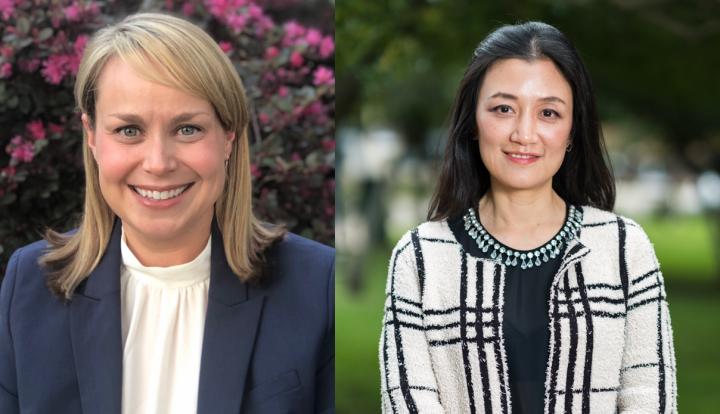Project matches students with dementia patients to document memories via digital storytelling

Credit: UT Arlington
The RRF Foundation for Aging awarded a multidisciplinary team from The University of Texas at Arlington with more than $160,000 for a project that explores the impact of reminiscence therapy and creation of digital memoirs on those diagnosed with Alzheimer’s disease and related dementia.
Members of the research team include:
- Noelle Fields and Ling Xu, both associate professors from the School of Social Work
- Kathryn Daniel, associate dean for academic affairs in the College of Nursing and Health Innovation (CONHI)
- Daisha Cipher, associate professor in CONHI
- Brooke Troutman, scholarly communications librarian
The team received $163,480 for its two-year project, “Intergenerational connections: Reminiscence and digital storytelling to improve social and emotional well-being of older adults with Alzheimer’s disease and related dementia.”
The project will pair UTA students with elderly dementia patients to encourage them to engage in a therapeutic dialogue about their childhood and other memories. The students will then create digital projects that reimagine or otherwise document these memories in one of many storytelling modes.
Xu said such dialogues are traditionally conducted by social workers or health care professionals, but a shortage of trained professionals provided a unique opportunity for UTA students.
“Student organizations from a variety of disciplines across the UTA campus–including those from social work, nursing, liberal arts, engineering and kinesiology–wrote letters of support for the study and have agreed to work with us,” Xu said.
Xu and Fields are the principal investigators on the grant and have been collaborating on research projects since they joined UTA in 2013. They will oversee all aspects of the project, including recruiting and training UTA students to work with older adult participants and observing the impact of the reminiscence and digital storytelling program on homebound older adults with early-stage dementia.
Daniel has expertise in interprofessional education for graduate gerontology nurse practitioner programming and is currently collaborating with Xu on an interdisciplinary UTA team examining social isolation and loneliness in later life. Cipher is a health outcomes researcher and biostatistician whose research interests include statistical risk modeling and statistical instruction tools.
Troutman will assist UTA students in their digital storytelling interventions and archive the final creations using tools available at UTA Libraries. Digital storytelling is a technology that typically uses audio-visual clips combining text, images, music, photographs, voiceover narration and other audio.
The team hopes the use of reminiscence combined with an intergeneration approach and digital storytelling will help promote improved social and emotional well-being of older adults. The project is expected to be completed by the end of 2022.
###
– Written by Alexandra Pirkle, UTA Libraries
Media Contact
Devynn Case
[email protected]
Original Source
https:/




